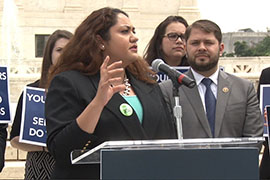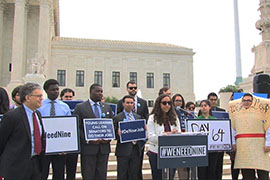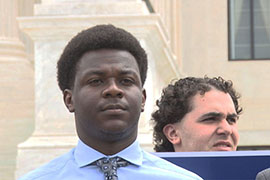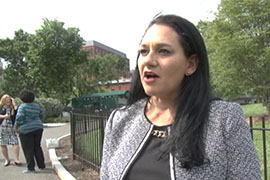- Slug: BC-CNS-Arizona Voices,740
- Photos available (thumbnails, captions below)
By KESHIA BUTTS
Cronkite News
WASHINGTON – Over two days last week, three Arizonans – a teacher, a former student and a immigration case worker – came to Washington to add their voices to the debate over Merrick Garland’s stalled Supreme Court nomination.
“You don’t have to tell my clients that the Supreme Court justice matters,” said Consuelo Hernandez, an immigration caseworker with the International Rescue Committee in Tucson, who said her clients ask “every single day” what’s going to happen with the court.
She was one of about 30 people from around the country – including recent Arizona State University graduate Jordan Uter – at a Capitol Hill rally Thursday with lawmakers calling for “fair consideration” of Garland’s nomination by the Senate.
It came one day after West Phoenix middle school teacher Marisol Garcia joined a dozen other teachers at the White House to talk about the Supreme Court’s 1954 school desegregation decision – and the importance of having a full court.
Each brought their own perspective to the issue, with speakers saying that Garland would be able to help the court deal with issues ranging from gay rights to immigration and voting, among others.
Experts say that while the voices of people from outside Washington can be moving, it’s unclear whether they will move the Senate to act on Garland’s nomination. But, they said, it can’t hurt.
“Popular pressure is always a way that social movements are able to convince elected officials to pursue policy,” said Paul Schiff Berman, the Walter S. Cox Professor of Law at the George Washington University Law School. “It may be that having pressure applied by constituents from those states may have an impact.”
But Berman, the former dean of the Sandra Day O’Connor College of Law at Arizona State University, said it can take more than a few voices to have that impact.
“In the case of Arizona, (Sen. John) McCain and (Sen. Jeff) Flake could, in theory, be convinced to push for a confirmation vote on Judge Garland if enough of their constituents push for that,” he said.
The Republican-controlled Senate has said it will not consider Merrick’s March 16 nomination to fill the seat left vacant by the sudden death of Justice Antonin Scalia in February. Senate leaders have said it is too close to the election of a new president, and that any nomination should be put off until the next president takes office.
Flake and McCain, both Republicans, have sided with leadership, although Flake has met with Garland.
Jason Rose, an Arizona political consultant at Rose+Moser+Allyn, said he thinks it will take many more Arizona voters like Hernandez coming to Washington to really make a difference.
“There need to be thousands more like them to move Sen. Flake and McCain off their certain positions,” Rose said.
But Fred Solop, professor of politics and international affairs at Northern Arizona University, said the voices of voters should not be discounted.
“Certainly in this political age of populism, input from constituents is important,” Solop said.
Those who come to Washington say it’s important to speak out, noting that the justices rule on issues that affect people every day.
“It’s important for the court to be in full strength. We have way too many important issues on the docket for us to play politics with,” said Uter, the recent ASU graduate.
“This (court) is the final arbiter of the laws, they need to make a definitive answer on these important issues,” he said.
Garcia said after her White House visit that there are cases before the court “that need to be decided by nine (justices). We need nine and our students deserve that.”
For Hernandez, the issue is personal. She said her clients live “day to day with uncertainty, asking me every single day what’s going to happen.”
“I don’t have an answer and it’s difficult to look in the face of my clients, immigrants, who are waiting, counting each day to see what is going to happen,” she said.
Democrats on the Hill and the Obama administration have been pushing for Senate confirmation hearings and a vote, with the White House going so far as to post a “confirmation tracker” counting the number of days since Garland was appointed.
Whatever the outcome, Solop praised the process.
“I think it’s wonderful that we have a system that encourages participation. If people can’t go to Washington, they can go to the (state) capital,” Solop said.
– Cronkite News reporter Sophia Kunthara contributed to this report.
^__=
Web links:
_ Garland nomination questionnaire: https://www.judiciary.senate.gov/imo/media/doc/Senate%20Judiciary%20Committee%20Questionnaire%205%209%202016.pdf
_ White House tracker: https://www.whitehouse.gov/scotus
_ Senate GOP statement on nomination hearing: http://www.republicanleader.senate.gov/newsroom/opeds/let-the-people-have-a-voice
^__=
Consuelo Hernandez, an immigration caseworker with the International Rescue Committee in Tucson, said clients ask “every single day” what’s going to happen with the court. (Photo by Keshia Butts/Cronkite News)
At a Supreme Court rally last week, speakers from around the country, including two from Arizona, joined members of Congress to call for a vote on Supreme Court nominee Merrick Garland. (Photo by Keshia Butts/Cronkite News)
Recent Arizona State University graduate Jordan Uter said at the Supreme Court that there are “way too many important issues on the docket” to play politics with nominee to the court. (Photo by Keshia Butts/Cronkite News)
West Phoenix middle school teacher Marisol Garcia was part of a White House meeting of teachers last week who said a full Supreme Court is necessary to handle school-related legal issues. (Photo by Sophia Kunthara/Cronkite News)



